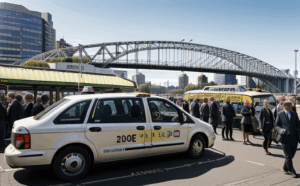Commuters and visitors across Perth and Kinross will soon experience a slight increase in taxi fares. Perth and Kinross Council, responsible for regulating taxi services within the region, recently approved a 5% rise in metered taxi fares. This decision follows a comprehensive review of operating costs for taxi drivers and the potential impact on passengers.
The council’s licensing committee carefully weighed the financial burdens faced by local taxi operators, considering factors such as fuel costs, vehicle maintenance, and insurance premiums. Simultaneously, they acknowledged the importance of keeping fares affordable for residents and visitors. The adjustments aim to strike a balance between supporting the livelihoods of those providing essential transportation services and ensuring accessible fares for the public. Current and Future Fares
Currently, the base fare for standard metered taxis within Perth and Kinross stands at £3.70 for the initial 880 yards, with subsequent charges calculated per additional 110 yards. For night-time travel, Sundays, and public holidays like Easter, the starting fare is slightly higher, at £4.70. Additional charges are calculated per 88 yards thereafter. Larger taxis accommodating five or more passengers currently adhere to the same higher rate regardless of the time of day.
The recently adopted 5% increase will affect all these rates. While the precise new fare structure is expected to be fully published soon, residents can anticipate a moderate rise in their overall taxi expenses. The council anticipates the new fares to be implemented approximately six weeks after the formal announcement. Council Consultation and Feedback
The fare adjustment isn’t a spontaneous decision. The council initiated a thorough consultation process to assess the needs of both taxi operators and the public. They contacted a significant portion of the region’s licensed taxi drivers, soliciting feedback on proposed fare changes. Responses indicated a broad spectrum of opinions, with a notable proportion favoring a 5% increase to reflect rising operational costs. The council carefully analysed this feedback before finalizing its decision.
The council’s report emphasized the need to consider the financial pressures on taxi businesses while acknowledging the potential impact of higher fares on passengers. The review highlights the council’s commitment to responsible regulation, balancing the interests of local businesses with the needs of the public they serve. This delicate balancing act is a common challenge faced by local authorities across the country, but particularly acute within Perth and Kinross, where the economy is influenced by tourism. The council has acknowledged the feedback from all sides before reaching a final conclusion, promising ongoing monitoring of fare levels. Beyond Fares: Taxi Licences Under Review
In addition to fare adjustments, the licensing committee is currently undertaking a separate review focusing on the number of taxi licenses issued within Perth. Currently, there’s a fixed limit of 80 licenses in the city. However, data suggests that wait times for taxis, particularly for vulnerable groups like wheelchair users, have lengthened in recent years. The council commissioned a study that provided in-depth passenger data. Results clearly indicated an urgent need to assess existing licensing policies.
The council aims to enhance the accessibility and availability of taxi services across the Perth and Kinross region, particularly addressing the challenges faced by those with limited mobility. This ongoing review explores two potential solutions: a moderate increase in the number of taxi licenses available, or the complete removal of the current cap. This decision will also be handled through a democratic process through the licensing committee, and further announcements are expected soon. Perth and Kinross: A Growing Region
Perth and Kinross boasts a vibrant economy, attracting numerous visitors throughout the year to its stunning natural landscape and the charming historic city of Perth. This influx of tourists, along with a steady increase in local population, puts considerable strain on existing transport infrastructure. Ensuring sufficient and affordable taxi services plays a crucial role in supporting both the local economy and the smooth flow of everyday life.
The council’s dual focus on both fare adjustments and license numbers demonstrates its active role in supporting the transportation industry while simultaneously addressing the transportation challenges faced by residents. The licensing committee’s decision-making process, involving comprehensive consultations and data analysis, underscores a commitment to informed and responsible governance within the community. The review of both fare adjustments and license numbers aims to strike a balance between maintaining a strong local taxi industry and providing fair and affordable service for all residents and visitors alike.
The upcoming changes promise a ripple effect throughout the region, affecting everyone from local businesses that rely on taxis for deliveries to the everyday commuter. This thorough review and democratic process ensures that the council is addressing a significant issue with carefully considered steps. Further public input is welcomed to ensure all voices are heard before the licensing committee reaches its final decision on the license cap. This will provide both the taxi industry and the general public with the clarity needed to adapt to any changes efficiently.
The council’s licensing committee carefully weighed the financial burdens faced by local taxi operators, considering factors such as fuel costs, vehicle maintenance, and insurance premiums. Simultaneously, they acknowledged the importance of keeping fares affordable for residents and visitors. The adjustments aim to strike a balance between supporting the livelihoods of those providing essential transportation services and ensuring accessible fares for the public. Current and Future Fares
Currently, the base fare for standard metered taxis within Perth and Kinross stands at £3.70 for the initial 880 yards, with subsequent charges calculated per additional 110 yards. For night-time travel, Sundays, and public holidays like Easter, the starting fare is slightly higher, at £4.70. Additional charges are calculated per 88 yards thereafter. Larger taxis accommodating five or more passengers currently adhere to the same higher rate regardless of the time of day.
The recently adopted 5% increase will affect all these rates. While the precise new fare structure is expected to be fully published soon, residents can anticipate a moderate rise in their overall taxi expenses. The council anticipates the new fares to be implemented approximately six weeks after the formal announcement. Council Consultation and Feedback
The fare adjustment isn’t a spontaneous decision. The council initiated a thorough consultation process to assess the needs of both taxi operators and the public. They contacted a significant portion of the region’s licensed taxi drivers, soliciting feedback on proposed fare changes. Responses indicated a broad spectrum of opinions, with a notable proportion favoring a 5% increase to reflect rising operational costs. The council carefully analysed this feedback before finalizing its decision.
The council’s report emphasized the need to consider the financial pressures on taxi businesses while acknowledging the potential impact of higher fares on passengers. The review highlights the council’s commitment to responsible regulation, balancing the interests of local businesses with the needs of the public they serve. This delicate balancing act is a common challenge faced by local authorities across the country, but particularly acute within Perth and Kinross, where the economy is influenced by tourism. The council has acknowledged the feedback from all sides before reaching a final conclusion, promising ongoing monitoring of fare levels. Beyond Fares: Taxi Licences Under Review
In addition to fare adjustments, the licensing committee is currently undertaking a separate review focusing on the number of taxi licenses issued within Perth. Currently, there’s a fixed limit of 80 licenses in the city. However, data suggests that wait times for taxis, particularly for vulnerable groups like wheelchair users, have lengthened in recent years. The council commissioned a study that provided in-depth passenger data. Results clearly indicated an urgent need to assess existing licensing policies.
The council aims to enhance the accessibility and availability of taxi services across the Perth and Kinross region, particularly addressing the challenges faced by those with limited mobility. This ongoing review explores two potential solutions: a moderate increase in the number of taxi licenses available, or the complete removal of the current cap. This decision will also be handled through a democratic process through the licensing committee, and further announcements are expected soon. Perth and Kinross: A Growing Region
Perth and Kinross boasts a vibrant economy, attracting numerous visitors throughout the year to its stunning natural landscape and the charming historic city of Perth. This influx of tourists, along with a steady increase in local population, puts considerable strain on existing transport infrastructure. Ensuring sufficient and affordable taxi services plays a crucial role in supporting both the local economy and the smooth flow of everyday life.
The council’s dual focus on both fare adjustments and license numbers demonstrates its active role in supporting the transportation industry while simultaneously addressing the transportation challenges faced by residents. The licensing committee’s decision-making process, involving comprehensive consultations and data analysis, underscores a commitment to informed and responsible governance within the community. The review of both fare adjustments and license numbers aims to strike a balance between maintaining a strong local taxi industry and providing fair and affordable service for all residents and visitors alike.
The upcoming changes promise a ripple effect throughout the region, affecting everyone from local businesses that rely on taxis for deliveries to the everyday commuter. This thorough review and democratic process ensures that the council is addressing a significant issue with carefully considered steps. Further public input is welcomed to ensure all voices are heard before the licensing committee reaches its final decision on the license cap. This will provide both the taxi industry and the general public with the clarity needed to adapt to any changes efficiently.


